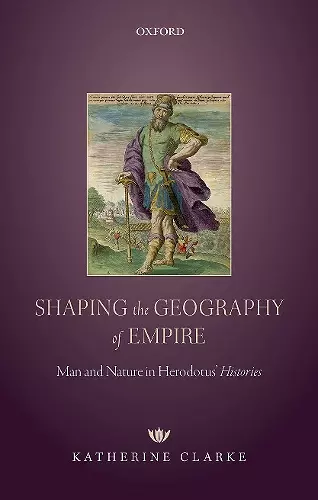Shaping the Geography of Empire
Man and Nature in Herodotus' Histories
Format:Hardback
Publisher:Oxford University Press
Published:21st Jun '18
Currently unavailable, and unfortunately no date known when it will be back

This volume explores the spatial framework of Herodotus' Histories, the Greek historian's account of Persian imperialism in the sixth and fifth century BC and its culmination in a series of grand expeditions against Greece itself. Focusing on his presentation of the natural world through careful geographical descriptions, ranging from continents and river and mountain networks on a vast scale down to the local settings for individual episodes, it also examines how these landscapes are charged with greater depth and resonance through Herodotus' use of mythological associations and spatial parallels. Man's interaction with, and alteration of, the physical world of the Histories adds another critical dimension to the meaning given to space in Herodotus' work, as his subjects' own agency serves to transform their geography from a neutral backdrop into a resonant landscape with its own role to play in the narrative, in turn reinforcing the placing of the protagonists along a spectrum of positive or negative characterizations. The Persian imperial bid may thus be seen as a war on nature, no less than on their intended subjects: however, as Herodotus reflects, Greece itself is waiting in the wings with the potential to be no less abusive an imperial power. Although the multi-vocal nature of the narrative complicates whether we can identify a 'Herodotean' world at all, still less one in which moral judgements are consistently cast, the fluid and complex web of spatial relationships revealed in discussion nevertheless allows focalization to be brought productively into play, demonstrating how the world of the Histories may be viewed from multiple perspectives. What emerges from the multiple worlds and world-views that Herodotus creates in his narrative is the mutability of fortune that allows successive imperial powers to dominate: as the exercise of political power is manifested both metaphorically and literally through control over the natural world, the map of imperial geography is constantly in flux.
Clarke's erudite style makes reading her book a challenging yet engaging experience...a significant strength of the book is its awareness of the many subtle connections and interactions within the intricate fabric of Herodotus' text...Clarke demonstrates the suggestive and evocative ways in which Herodotus encourages his audience to compare and weigh his geographical information in relation to his larger narrative enterprise. Her book pays due homage to Herodotus as an observer of the natural world affected by human interference, a topic of prime relevance to any 21st century audience. * Mathieu P. de Bakker, sehepunkte *
ISBN: 9780198820437
Dimensions: 220mm x 147mm x 26mm
Weight: 578g
368 pages